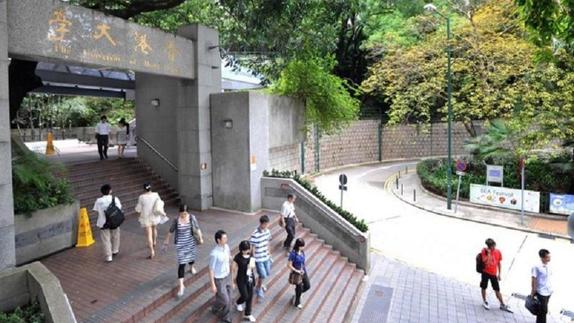 This undated photo shows a general view of the University of Hong Kong. (PHOTO / HKSAR GOVERNMENT)
This undated photo shows a general view of the University of Hong Kong. (PHOTO / HKSAR GOVERNMENT)
Hong Kong college students are expected to have a better understanding of national development as completing national education courses has become a requirement for graduation.
The eight public universities in Hong Kong have launched national education courses one after another to inform students on the Basic Law, the National Security Law for Hong Kong, and other elements including the city's legal systems and development of the Guangdong-Hong Kong-Macao Greater Bay Area.
The eight public universities in Hong Kong have launched national education courses one after another, two years after the National Security Law for Hong Kong was introduced on June 30, 2020
The curriculum upgrade came three years after the city was rocked by incessant violence and street vandalism in 2019 and two years after the National Security Law for Hong Kong was introduced on June 30, 2020.
READ MORE: HK to strengthen national education
On July 25, the University of Hong Kong announced in its email to students that all students will be required to complete a non-credit online course-Introduction to the Constitution, the Basic Law and the National Security Law-in the academic year 2022/23.
Students can take this course in any semester. Those who will graduate in 2022/23 and thereafter will need to pass the course to graduate.
Similarly, Hong Kong Polytechnic University has adopted the national education curriculum-a law-abiding leadership education featuring modern Chinese history, national security, and the Hong Kong National Security Law-for all four-year undergraduate students starting the 2021/22 academic year.
Around 92 percent to 95 percent of the PolyU students surveyed in the two semesters agreed that they would strive to serve as socially responsible leaders. They also agreed the course equipped them with knowledge about law-abiding behavior and national security
In a reply to China Daily, PolyU said it will extend the national education curriculum to all senior year students in top-up degree courses and postgraduate students in different forms in the upcoming 2022/23 academic year.
ALSO READ: Rethink, readjust and restart national education campaign
The school said student feedback on the National Education has been positive and encouraging, citing a post-lecture evaluation, which surveyed students taking the law-abiding leadership course in the 2021/22 academic year. Around 92 percent to 95 percent of the students surveyed in the two semesters agreed that they would strive to serve as socially responsible leaders. They also agreed the course equipped them with knowledge about law-abiding behavior and national security.
Chinese University of Hong Kong is also planning to launch two mandatory courses, with one focusing on knowing the country and the other centering on the national constitutional order and its relation with Hong Kong in the next academic year for all undergraduate students.
READ MORE: Now’s time to upgrade city’s national security education
Meanwhile, Hong Kong University of Science and Technology will roll out a new compulsory self-learning noncredit online course covering the Constitution, the Basic Law, the National Security Law for Hong Kong and the Hong Kong legal system. Students will need to pass the tests.
In addition, starting from the 2023/24 academic year, students of the Education University of Hong Kong will be required to take an inter-faculty course on the Greater Bay Area. The university will also arrange all undergraduate students to visit the Greater Bay Area in stages at the same time.
Welcoming the initiatives, lawmaker Tang Fei said he is happy to see that all public universities in Hong Kong have voluntarily rolled out national education courses.
As higher education institutions, the universities are expected to offer more in-depth information and thus help raise young people's awareness of the importance of national security more effectively, Tang added.


